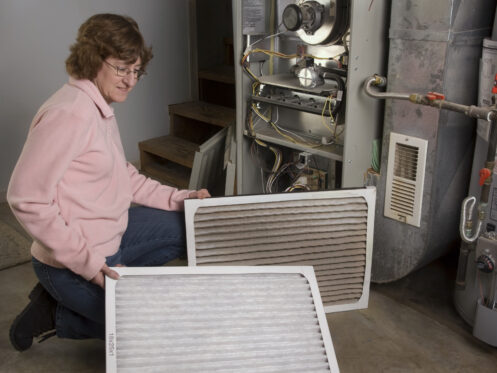Given their low operating costs and rapid heating, natural gas furnaces are a top choice in Greensboro, NC. With a gas furnace, you can look forward to lower energy bills, enhanced home comfort, and surprising levels of efficiency. However, caring for your heating equipment should always be a top priority. The following are several tips to help you get started.
Schedule Gas Furnace Maintenance Every Year
Irrespective of their age, all gas-fired furnaces require professional maintenance annually. Furnace tune-up service is essential for ensuring that your heater is combusting gas cleanly and efficiently, routing exhaust gases out of your home, and evenly distributing warm air throughout the entire building.
What Does a Gas Furnace Tune-up Entail?
During these appointments, our technicians inspect and clean all interior and exterior furnace components. We remove build-ups of debris from air intake valves, thermocouples, and more. We also replace damaged, loose, or missing parts, calibrate all thermostats, and assess the integrity of HVAC air ducts.
Our team additionally looks for crushed or collapsed exhaust vents, vent blockages, and failing or unreliable safety features and failsafe measures. We test blower motors and fans and inspect heat exchangers for cracks or other signs of advanced aging.
Why Professional Gas Furnace Maintenance Is Essential
As fuel-combusting appliances, natural gas furnaces produce carbon monoxide gas and other dangerous emissions all of the time. Although these gases get routed out of your home by your furnace’s venting system, there’s always the potential for dangerous back-drafting events, natural gas leaks, and CO exposure. By carefully inspecting exhaust vents and ensuring proper combustion, we limit the risk of these health hazards and keep building residents protected.
Annual Furnace Maintenance: Your Manufacturer’s Warranty Requires It
Scheduling annual furnace maintenance is also a common stipulation in product manufacturer warranties. If your furnace is still under warranty, skipping these appointments could result in the voidance of all relevant protections. To avoid frustrating claims denials or delays, be sure to schedule this service every 12 months.
Your Furnace Will Last Longer With Annual Maintenance
Annual tune-up services extend the lifespans of fuel-combusting furnaces. By replacing worn parts, testing failsafe measures, and removing airflow obstructions and built-up debris, we limit stress on heating equipment. Not only will this make your furnace last longer, but it will also limit the risk of costly problems.
Cut Your Heating Costs
Well-tuned furnaces use less energy to get their jobs done. If you’re looking for an easy way to decrease your carbon footprint, scheduling annual furnace maintenance is it. The best time to schedule these services is just before autumn ends. This way, your heating equipment will be primed and ready for the challenges of the cold season.
Test and Maintain Your CO Alarms
Whenever there’s a risk of CO exposure, homes must have multiple CO detectors installed. These alarms sense carbon monoxide in the air and send out noisy alerts. Given that CO is both colorless and odorless, these alarms are vital for protecting human health. During annual furnace maintenance, we test these devices and replace their batteries as needed.
Thermostat Inspections and Care
A lot can happen in your home throughout the year. Many people change their window treatments, chop down trees, move their furnishings, and add new appliances. With a central heating system, you should have your thermostat installed in a central, neutral area. If it’s currently too near any heat-generating appliances or electronics, it will have a hard time reading your indoor temperature accurately.
When tuning your furnace up, we’ll carefully assess your thermostat’s location. If your thermostat is frequently bathed in sunlight, close to a high-powered gaming computer, or right near your oven, we’ll relocate it to a more suitable space, calibrate it, and test its performance.
Change Your Furnace Filter Every 30 to 90 Days
For homeowners, furnace filter changes are an important, ongoing responsibility. As per most furnace manufacturers, you should inspect your furnace’s filter every 30 days and change it every one to three months. Failing to do so will diminish airflow throughout your entire heating system, decrease your indoor air quality (IAQ), and create the risk of fires. It can also lead to the cancellation of your furnace warranty’s protections.
If you have a hard time remembering to replace this component, have a smart thermostat installed. In addition to offering helpful energy consumption reports and automatically making pre-set temperature changes, many of these Wi-Fi-enabled, learning devices can also send out regular filter change alerts.
Identify and Resolve Humidity Issues
Central HVAC equipment doesn’t just regulate indoor temperatures. It also regulates humidity and filters the indoor air. If you have a condensing gas furnace that’s struggling in any of these areas, it’s important to find out why. Your furnace may be having problems regulating humidity if you constantly have condensation-covered windows and walls or if your home feels muggy and oppressive when the heater is on.
Excess humidity could be the result of a dirty furnace filter or another airflow obstruction, a blocked condensate drain, or a compressor problem that’s causing short cycling. However, it might be that your household produces more moisture than your furnace can reasonably extract. For instance, if there are lots of people living in your home, then there are lots of people taking hot baths and showers and completing steamy cooking projects. Unchecked humidity issues can lead to inefficient and uneven heating, mold problems in your living space and HVAC ducting, and more. Rather than ignoring the issue, consider having a whole-house humidifier put in.
Know Where Your Outdoor Exhaust Vents Are and Keep Their Perimeters Clear
Your furnace’s exhaust vents should be located at the exterior of the building near your home’s foundation. However, these features are sometimes located on roofs. No matter where your exhaust vents are, it’s important to keep them free of obstructions that might prevent exhaust gases from exiting the building. For PVC, ABS, or CPVC exhaust pipes at ground level, clear away all leaves, twigs, loose silt, and nests. If your exhaust vents are on your rooftop, schedule professional roof inspection and cleaning services in mid-fall and late spring to get rid of any organic materials that your trees have shed. During winter, it’s also important to keep exhaust vents clear of heavy snow loads, ice, and other freezing precipitation.
Schedule Professional HVAC Air Duct Cleaning
Eliminating and preventing airflow obstructions is another important part of keeping your natural gas furnace working as it should. Although you can limit in-duct build-ups by regularly changing your furnace’s air filter, you should also schedule air duct cleaning as needed. The National Air Duct Cleaners Association (NADCA) recommends cleaning these features every two to three years.
Have an Indoor Air Quality Assessment Performed
When you own fuel-combusting appliances, it’s important to have your indoor air quality (IAQ) periodically assessed. This evaluation will tell you whether or not there are unsafe levels of CO gas around your furnace’s perimeter. If your home envelope is overly tight, an IAQ assessment can also determine your risk of developing negative air pressure indoors and resulting problems with back-drafting.
Residents of Greensboro, NC can count on us for expert air conditioning, heating, electrical, and plumbing services. We also provide ductwork installation and repairs, smart thermostats, whole-house humidification and dehumidification equipment, and preventative maintenance plans. To schedule an appointment, contact Aurora Pro Services Heating, Air, Plumbing, Electrical, & Roofing now.






